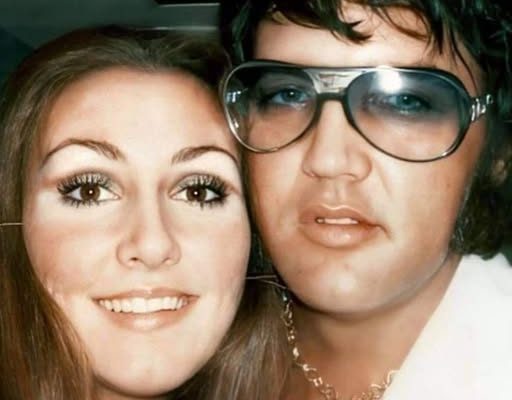Few love stories in Hollywood history have been as complex—or as bittersweet—as that of Elvis Presley and Linda Thompson. Their romance burned bright through the 1970s, defined by passion, loyalty, and pain. Though their relationship ended just a year before Elvis’s untimely death, Linda remains one of the few people who saw both the legend and the man behind the fame.
Now, nearly five decades later, Linda is opening up about her years with Elvis—the joy, the heartbreak, and the reasons she finally had to walk away from the King of Rock and Roll.
From Memphis Girl to Beauty Queen
Linda Thompson was born on May 23, 1950, in Memphis, Tennessee—just a short drive from where Elvis would one day build his kingdom at Graceland. Even as a little girl, she felt a strange connection to the singer who was electrifying the world. “I told my parents when I was six,” she recalled years later, “I’m going to marry Elvis Presley.” It sounded like a fantasy, the kind only a child could believe. But destiny, it seems, had other plans.
By her late teens, Linda had blossomed into a local celebrity in her own right. She won beauty pageants, earning titles such as Miss Shelby County and Miss Memphis State University. In 1972, she went on to be crowned Miss Tennessee and finished third in the Miss USA competition. But it wasn’t fame she sought—it was direction. What she didn’t know was that her life was about to collide with the most famous man on Earth.
When Their Worlds Collided
That same year, Elvis Presley’s marriage to Priscilla had officially ended. He was lonely, restless, and still performing to sold-out arenas across the world. During one of his private film screenings in Memphis, a mutual friend introduced him to a radiant young woman who walked into the room and instantly changed the energy.
“Elvis turned to me and said, ‘Well, hello honey!’” Linda later recounted with a laugh. She hadn’t realized he was newly single. “I was nervous, but he made everyone feel like they’d known him their whole life.”
Within weeks, Linda was visiting Graceland regularly. Before long, she moved into the mansion, trading pageants and small-town normalcy for life beside the King.
Inside Graceland: Love and Turmoil
What followed was a romance that blended glamour and heartbreak in equal measure. Linda described their bond as “deep, spiritual, and unlike anything I’ve ever known.” They were lovers, confidants, and, in many ways, caretakers for one another.
“Elvis was incredibly kind, generous, and funny,” she said. “He had this magnetic pull. But he also carried an immense sadness that never left him.”
Behind the flashbulbs and the fame, Linda saw a man struggling—physically, emotionally, and spiritually. By 1973, Elvis was a global phenomenon. His “Aloha from Hawaii” concert became the first live satellite broadcast by a solo artist, viewed by millions around the world. To fans, he was invincible. But Linda knew the truth: Elvis was deteriorating.
Prescription medications had become his silent companion. His once-vibrant energy was dimming. Linda found herself stepping into the role of nurse and protector. “I would check on him in the middle of the night just to make sure he was still breathing,” she admitted. “I loved him more than life itself, but it was heartbreaking to watch him self-destruct.”
The Breaking Point
For several years, Linda devoted herself entirely to Elvis. She traveled with him, comforted him, and shielded him from the chaos that came with fame. But by 1975, the toll was undeniable.
“Elvis’s health was declining,” she recalled. “There were nights I’d find him barely conscious, and I’d have to get him help.” On one occasion, she rushed him to the hospital after finding him gasping for breath. Doctors diagnosed liver complications, though they insisted it wasn’t due to alcohol.
Emotionally exhausted and fearing for her own well-being, Linda made the painful decision to leave. “It wasn’t because I stopped loving him,” she said softly. “It was because I couldn’t save him. And staying meant losing myself completely.”
A Final Goodbye
Even after their separation, Linda and Elvis stayed in touch. They shared phone calls, letters, and the occasional visit. She never stopped caring about him, and he never stopped calling her “darlin’.”
A few days before his death, Linda called Graceland to check in. One of Elvis’s close friends answered and assured her he was doing fine. Linda’s final message, relayed through the phone, was simple: “Tell him I love him.”
On August 16, 1977, Elvis Presley was found unresponsive in his Graceland bathroom. The news spread like wildfire across the globe. He was only 42.
When Linda heard the words, she collapsed. “I couldn’t breathe,” she later said. “Even though I wasn’t with him, a part of me died that day.”
The Woman Behind the Legend
Over the years, Linda has remained protective of Elvis’s legacy. She has never exploited their relationship, instead choosing to tell his story with tenderness and honesty. Her 2016 memoir, A Little Thing Called Life, revealed the depth of their connection—the laughter, the pain, and the quiet moments in between that the public never saw.
“Elvis was the love of my life,” she wrote. “He wasn’t perfect, but no one loved more deeply than he did. And for a time, I was lucky enough to be on the receiving end of that love.”
Today, Linda is recognized not only as Elvis’s former partner but also as an accomplished songwriter and author. She went on to build a successful career in entertainment, writing hits for artists like Whitney Houston and Celine Dion. But no success ever overshadowed the impact Elvis left on her soul.
“People ask if I regret leaving,” she said in a recent interview. “I don’t. I think leaving when I did was the only way I could love him purely. Staying would have meant watching him die piece by piece.”
Elvis’s Enduring Echo
Nearly fifty years after his passing, Elvis Presley remains an icon—a symbol of rebellion, charm, and the raw power of music. But to Linda, he’s still the man who sang to her softly in the early hours of the morning, who scribbled notes on napkins, who whispered that fame was lonelier than anyone could imagine.
“He once told me,” Linda said, “that people only saw the King, but he wished they’d seen the man. I did. And that’s the version of Elvis I carry with me.”
Their love may have ended before his life did, but its echo still hums through her words, her memories, and the countless fans who still feel his presence today.
In the end, Linda Thompson’s story isn’t just about loving a legend—it’s about loving a man who could move the world with a song yet struggled to save himself from silence.
And in telling his story, Linda keeps that music alive—note by note, memory by memory.



